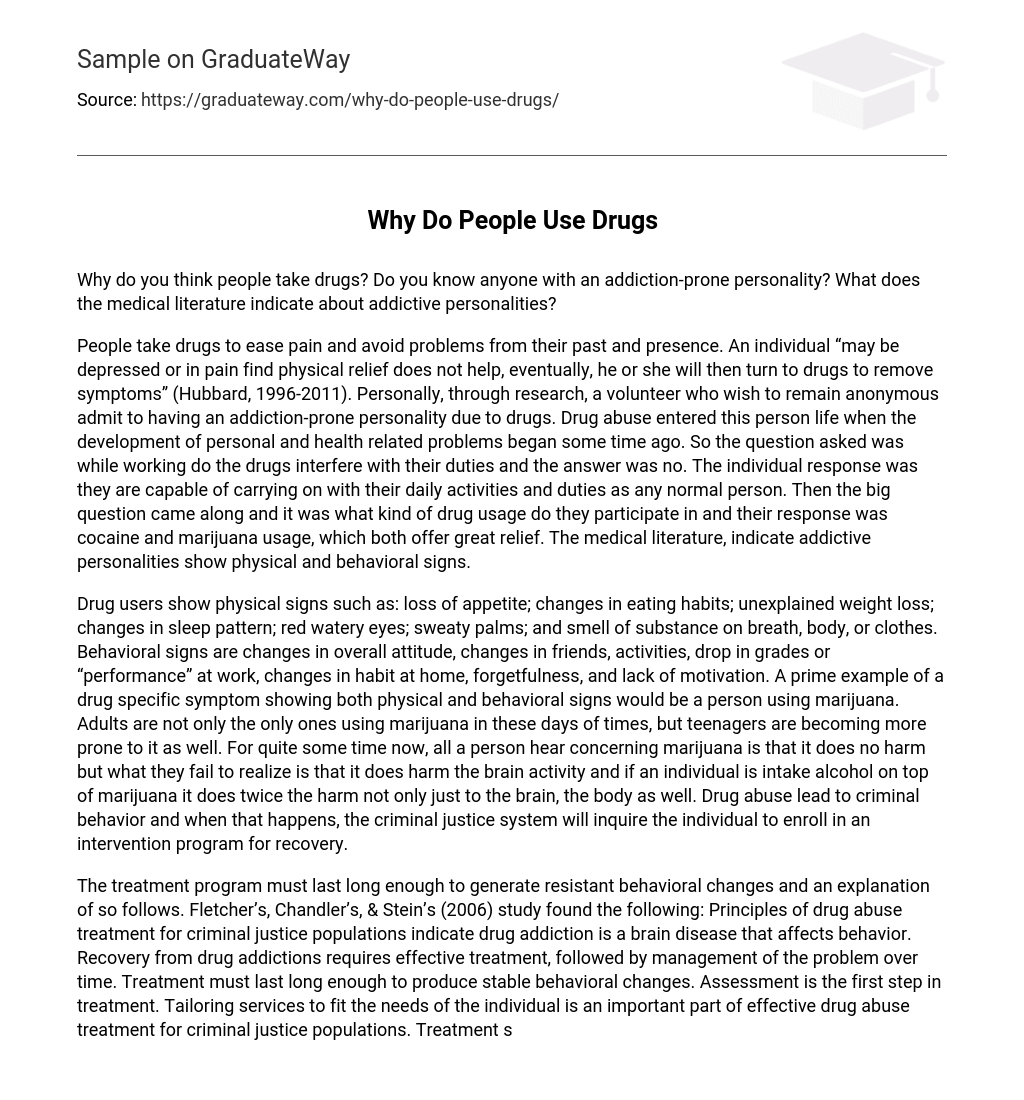Why do you think people take drugs? Do you know anyone with an addiction-prone personality? What does the medical literature indicate about addictive personalities?
People take drugs to ease pain and avoid problems from their past and presence. An individual “may be depressed or in pain find physical relief does not help, eventually, he or she will then turn to drugs to remove symptoms” (Hubbard, 1996-2011). Personally, through research, a volunteer who wish to remain anonymous admit to having an addiction-prone personality due to drugs. Drug abuse entered this person life when the development of personal and health related problems began some time ago. So the question asked was while working do the drugs interfere with their duties and the answer was no. The individual response was they are capable of carrying on with their daily activities and duties as any normal person. Then the big question came along and it was what kind of drug usage do they participate in and their response was cocaine and marijuana usage, which both offer great relief. The medical literature, indicate addictive personalities show physical and behavioral signs.
Drug users show physical signs such as: loss of appetite; changes in eating habits; unexplained weight loss; changes in sleep pattern; red watery eyes; sweaty palms; and smell of substance on breath, body, or clothes. Behavioral signs are changes in overall attitude, changes in friends, activities, drop in grades or “performance” at work, changes in habit at home, forgetfulness, and lack of motivation. A prime example of a drug specific symptom showing both physical and behavioral signs would be a person using marijuana. Adults are not only the only ones using marijuana in these days of times, but teenagers are becoming more prone to it as well. For quite some time now, all a person hear concerning marijuana is that it does no harm but what they fail to realize is that it does harm the brain activity and if an individual is intake alcohol on top of marijuana it does twice the harm not only just to the brain, the body as well. Drug abuse lead to criminal behavior and when that happens, the criminal justice system will inquire the individual to enroll in an intervention program for recovery.
The treatment program must last long enough to generate resistant behavioral changes and an explanation of so follows. Fletcher’s, Chandler’s, & Stein’s (2006) study found the following: Principles of drug abuse treatment for criminal justice populations indicate drug addiction is a brain disease that affects behavior. Recovery from drug addictions requires effective treatment, followed by management of the problem over time. Treatment must last long enough to produce stable behavioral changes. Assessment is the first step in treatment. Tailoring services to fit the needs of the individual is an important part of effective drug abuse treatment for criminal justice populations. Treatment should target factors that are associated with criminal behavior. Criminal justice supervisions should incorporate treatment planning for drug abusing offenders and treatment providers should be aware of correctional supervision requirements.
Continuity of care is essential for drug abusers re-entering the community. A balance of rewards and sanctions encourages pro-social behavior and treatment participation. Offenders with co-occurring drug abuse and mental health problems, often requires an integrated treatment approach. Medications are an important part of treatment for many drug abuse offenders. Treatment planning for drug abusing offenders who are living in or re-entering the community should include strategies to prevent and treat serious, chronic medical conditions, such as HIV/AIDS, hepatitis B and C, and tuberculosis (p. 3 and p.4).
Works Cited
Missions, C. o. (1996-2011). Why Do People Take Drugs? Washington, D.C.: Dianetics and Scientology.
Works Cited
Leshner, A. L. (1997). The Reason Behind the Drug Problem. In S. a. Symp, National Institution on Drug Use (p. 87). Phoenix: Phoenix House. Missions, C. o. (1996-2011). Why Do People Take Drugs? Washington, D.C.: Dianetics and
Scientology.
Works Cited
Bennett W. Fletcher, P. D. (2006). Principles of Drug Abuse Treatment for Criminal Justice Populations. South Florida: National Institution Drug Abuse. Leshner, A. L. (1997). The Reason Behind the Drug Problem. In S. a. Symp, National Institution on Drug Use (p. 87). Phoenix: Phoenix House. Missions, C. o. (1996-2011). Why Do People Take Drugs? Washington, D.C.: Dianetics and Scientology.





